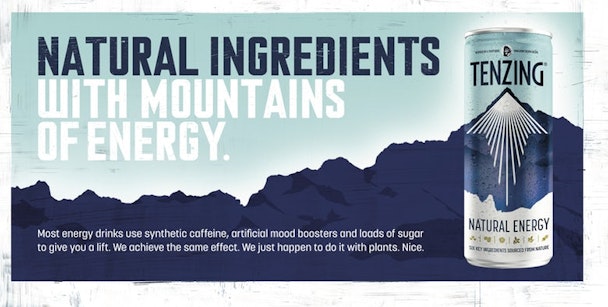The launch lowdown: Netflix, Nat Geo and the world’s most influential burger – allegedly
North and South Korea vowed to end the bitter war between them. Abba announced two new songs and a holographic tour. The Chuckle Brothers are returning with a new show called – wait for it – Chuckle Time. April. What a month. What a time to be alive.

Chuckle Brothers aside, there were loads of launches and relaunches to shout about, from Netflix to The National Geographic, from you, to me, to you.
Sorry.
Ex-Red Bull man swaps soapboxes for summits
In late December 2014, Red Bull’s UK marketing director, Huib van Bockel, stepped down. The next year, he launched a new energy drink: Tenzing. Named after Tenzing Norgay, one of the first two humans to ever summit Mount Everest, it contains Himalayan salt; the cans are BPA-free, and crafted from 100% recyclable aluminum; and it’s generally pumped full of less artificial nonsense than your common or garden energy drink.
And a mere couple of weeks after the UK sugar tax kicked in, Tenzing revamped its look, celebrated a national listing boost and swooped onto the London Underground with an OOH campaign, proudly showing off its ‘natural ingredients with mountains of energy’.
In the ad, it proceeded to rubbish other energy drinks’ reliance on sugar. Because, funnily enough, 100ml of Tenzing contains 4.9 grams of sugar. The sugar tax applies to 5g and over. It’s a low-blow to the innumerable brands scrabbling around for solutions in the wake of the legislation, a sign of a brand staying ahead of its market, and confirmation that maybe, just maybe, we’ll be weaned away from sugar in the future. Maybe.
Netflix launches new Google Home initiative, world domination imminent
Battered yet apparently refusing to be put to pasture, the nostalgia horse is being flogged just as hard in 2018 as it was last year. But some of the stuff that’s coming out now is, y’know, actually advancing the conversation, rather than just reminding us of things we used to like to distract us from the numbing, overbearing reality that we’ll never experience joy again…
...Anyway, Netflix has relaunched a shiny, updated version of the ‘60s sci-fi show, Lost in Space. Partnering with Google Home around the title’s release, it revealed an interactive audio game in which you can delve deeper into the show’s universe. You can talk directly to the protagonists, and it’s not just a nice little novelty – what you tell them directly affects the adventure’s outcome, so you can play multiple times. Each playthrough clocks in at round five minutes, so it’s not like they’ve created a Skyrim-worthy alternate reality; nor is it a first, seeing as Amazon already did something similar with Batman a couple of years ago. But it’s a genuinely engaging brand extension, a unique launch asset, and something to fill the gaps when trying to get everyone to sit down and watch Netflix at the same time.
Butcher adds vegan burger to menu because YOLO or something
White Castle is Bruce Springsteen. It is Marilyn Monroe, it is a bald eagle in bread buns. Time magazine named its slider "the most influential burger of all time". That’s a lot of pressure for a pile of meat.
So, after nearly a century of selling beef, White Castle flipped itself over. In association with Impossible Foods, it debuted a meat-free, vegan-friendly version of its world-renowned slider. And that seems odd. But it’s not. McDonald’s is rolling out vegan options. Tesco released a lauded, sell-out plant-based line in January.
This isn’t a trend, it’s not going away, so instead of pushing it into a corner and hoping it dies like an unwanted Tamagotchi, White Castle acknowledged it. It adapted. It’s refusing to lose custom, expanding its offering without betraying its core values. And if the burger’s not a hit? White Castle tried. More brands need to take note – something as counterintuitive as this, as initially odd as this, is a smart move and a step towards stability if veganism does pick up even more.
If the National Geographic can rebrand, then so can whatever it is you do
Print is dead, apparently. #content is king, apparently.
The National Geographic didn’t get the memo and I’m so glad nobody told the team. Because this facelift – the biggest relaunch the magazine has undertaken in 18 years – has done wonders. In an age where the physical copy is an artefact, National Geographic has unveiled a chest of gold.
Packing several new features, a focus on longer, in-depth cover stories, snappier visual segments and an upgraded paper stock so premium it really does put Nat Geo readers in the same camp as the ‘Vinyl sounds warmer!’ folk, the magazine has proven itself even more relevant, even more collectable in a digital, seemingly disposable age.
Now, if only they’d get the Chuckle Brothers to do a guest column...
James Roles is sales and marketing director at launch specialist agency Five by Five
